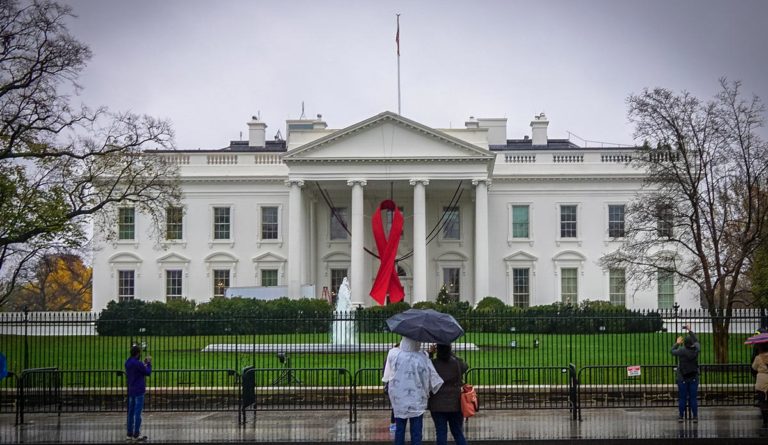Trump Policies Hinder HIV Fight
Trump’s 2019 State of the Union promise to eliminate the HIV epidemic in the US within 10 years is undermined by policies his administration has promoted.

Read Time: 4 minutes
Published:
In his February 5, 2019 State of the Union Address, President Trump said, “My budget will ask Democrats and Republicans to make the needed commitment to eliminate the HIV epidemic in the United States within 10 years… Together, we will defeat AIDS in America. And beyond.”
A bipartisan commitment to end HIV transmissions in the US and around the world by 2030 would be a welcome development. The US global AIDS relief program, launched in 2003 with bipartisan support, has had great success in helping get 20 million people onto life-saving treatment, and dramatically reducing HIV incidence and deaths. Despite treatment scale-up and advances like pre-exposure prophylaxis (PrEP), every year 38,000 people are newly infected in the US, and 1.8 million around the world. Striking racial/ethnic, gender, and sexuality disparities exist.
Trump’s promise was greeted with some skepticism among HIV and LGBT advocates because, in the first two years of his administration, he promoted policies that exacerbate HIV and LGBT stigma and discrimination, key drivers of the epidemic. He has also made it harder for people living with HIV and LGBT people to get health care.
The Peace Corps and the US Air Force have dismissed individuals diagnosed with HIV. The Trump Administration has banned transgender people from military service, and is housing transgender federal prisoners based on their sex at birth instead of their gender identity, which increases their chances of being raped.
The administration has promoted regulations that authorize religious conservatives “not to act contrary to one’s beliefs” when providing health care. What does this mean for a lesbian couple seeking fertility assistance? A transgender patient seeking gender affirming care? Or a bisexual man seeking testing or treatment for a sexually transmitted disease?
Trump has not appointed an AIDS czar for two years. His FY18 budget proposal sought to cut domestic HIV prevention funding by 17%, eliminate entire Ryan White programs, and cut more than $1 billion from the global AIDS program.
Trump has not appointed an AIDS czar for two years. His FY18 budget proposal sought to cut domestic HIV prevention funding by 17%, eliminate entire Ryan White programs, and cut more than $1 billion from the global AIDS program.
In late 2017 Trump summarily dismissed the Presidential Advisory Council on HIV/AIDS (PACHA) though the council was reconstituted in late 2018 and is supposed to meet in March, 2019.
President Trump has taken a number of steps to weaken the Affordable Care Act, which has dramatically reduced uninsurance rates among people living with HIV, LGBT people and people of all racial and ethnic backgrounds. In 2018, his administration expanded access to cheap, short-term insurance plans that do not cover pre-existing conditions, like HIV or cancer.
A recent study found that Black and Latino men who have sex with men (MSM) were more likely than other MSM to regard having to talk with their doctor about their sex lives as a barrier to accessing PrEP for HIV prevention. Half of Black MSM live in the South, which has mostly refused to expand Medicaid eligibility. As a result, many Black gay men—25% of new HIV diagnoses in the US—do not access basic health care, let alone competent care.
The Trump Administration has dropped LGBT equality, and human rights more broadly as foreign policy priorities. This is in sharp contrast to the Obama Administration, which promoted LGBT equality as a key goal of US foreign policy.
It is no coincidence that, since 2017, governments have unleashed waves of anti-gay persecution in Tanzania, Chechnya, Russia, and Indonesia.
We welcome President Trump’s initiative to dramatically reduce new HIV infections in the US and look forward to learning more. However, if the President really wants to have success with this initiative, he should stop promoting discriminatory policies that exacerbate HIV stigma and make it harder for vulnerable gay and bisexual men and transgender women, especially Black LGBT people in the South, to access preventive health care.
Feature image: Ted Eytan, 2015 World AIDS Day (Obama Administration) – Red Ribbon on White House – Washington DC USA 00410, used under CC BY-SA 2.0



